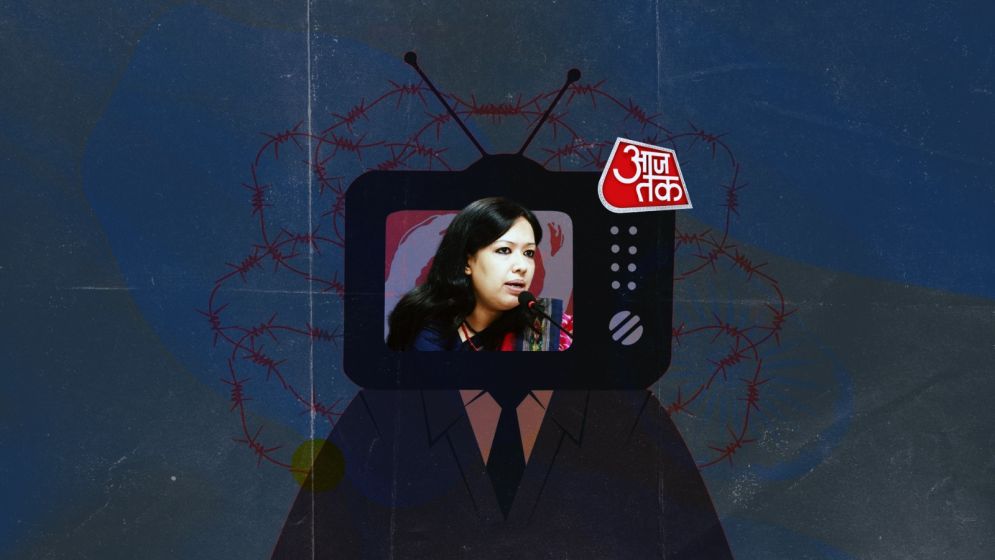When Rumeen Farhana played cheerleader for the wrong side

By any standard of political maturity, moments of national vulnerability call for a pause in partisan fire. Across the world, even bitter rivals rally behind their flags when external threats loom.
In India, Shashi Tharoor–never shy in his critique of the Modi regime–stood shoulder to shoulder with New Delhi during the Pakistan standoff, reminding the world that some values transcend party lines.
Asaduddin Owaisi, too, publicly took Dhaka to task when Bangladeshi interests clashed with his own cultural affiliations. These men know the difference between internal dissent and external sabotage.
And then there is Rumeen Farhana.
In a post-Hasina Bangladesh, fresh from the shockwaves of the July Uprising and still finding its democratic footing, one might expect political leaders to tread carefully on the international stage– to speak not just as partisans, but as patriots.
Farhana, once hailed as a principled voice of resistance within the BNP, chose instead to break ranks in the most bewildering fashion: by granting an interview to Aaj Tak Bangla, an Indian outlet notorious for its alignment with Hindutva forces and its relentless campaign of misinformation against Bangladesh.
This wasn’t an act of bold diplomacy. It was a reckless monologue delivered on hostile turf.
Farhana’s appearance on Aaj Tak Bangla appeared like a full-throated capitulation. She mocked Nobel laureate Dr. Muhammad Yunus, undermined the credibility of the interim government, and parroted lines that could have been pulled directly from the Awami League’s propaganda machine.
The tone was smug. The substance, alarmingly familiar. Her tirade did not read as principled dissent–it sounded like the script of a disinformation campaign written elsewhere and recited by someone craving applause from the wrong audience.
Let us be clear: Aaj Tak Bangla is not just another news channel. It has been condemned by the Bangladesh Armed Forces for disseminating fake stories– including, just days ago, a fabricated headline alleging General Wakar Uz Zaman sought refuge in India.
For a political figure of Farhana’s stature to offer this platform legitimacy–to lend it credibility by appearing on it in such a pivotal moment–is more than tone-deaf. It’s a breach of nationalist integrity.

Not a reasoned critique
This was not the reasoned critique expected of a democratic opposition. It was something else entirely–a performance that left supporters bewildered and critics jubilant.
In content and cadence, her message mirrored the same anti-opposition dogma that Hasina’s regime once deployed to silence dissent. She derided reform efforts, dismissed the interim government’s authority, and painted a picture of chaos that served India’s strategic narrative, not Bangladesh’s sovereign one.
Who exactly was she speaking for?
Farhana’s intervention raises deeper concerns about the BNP’s internal coherence. When political opposition’s voices start to echo the rhetoric of the very regime they once fought to dethrone, something has gone profoundly wrong.
Her comments essentially didn’t challenge power– they recycled it. Her tone was deferential, directed not to the Bangladeshi public, but seemingly to an audience far across the border.
At a time when Bangladesh is struggling to reclaim its narrative–to shake off decades of political subservience and redefine its role in the region–this kind of grandstanding does more than damage a politician’s credibility. It undercuts the very spirit of self-determination.
The problem is Farhana didn’t simply criticize the interim administration. She confirmed every narrative India has been working overtime to construct: that without its supervision, Bangladesh is ungovernable.
That the fall of Hasina has left a vacuum only India is qualified to fill. It was not opposition–it was validation. And it came at the worst possible time, just as Bangladesh is fighting to define its own voice after years of being treated like a client state.
This is why so many in Dhaka’s political circles are calling her out– not for speaking out, but for where, how, and to whom she chose to speak.

Poor excuses
Some have tried to excuse her actions as a case of poor judgment–an error born of inexperience, or perhaps an inability to grasp the larger geopolitical stakes.
But others aren’t buying it. The most corrosive impact of her interview isn’t what it did to her own reputation–it’s the damage it inflicted on the fragile coalition that stood up to Hasina in the first place.
Her contrast with others who have spoken to Indian media could not be sharper. Take Barrister Rashna Imam or Mahfuz Anam, for instance. Their interviews, while critical of domestic missteps, were careful not to give foreign actors a license to meddle.
Farhana, by contrast, mocked the very institutions trying to rebuild the republic, sounding less like an opposition figure and more like an expatriate heckler–or worse, a mouthpiece for a foreign brief.
And yet, the silence that followed may be even more telling. Not from Rumeen–who, predictably, has doubled down–but from the very party that made her a national figure: the BNP.
While civil society, journalists, and activists have erupted in criticism, BNP’s senior leadership has opted for a convenient retreat into silence.
That silence is damning.
It suggests either an absence of strategic clarity–or worse, a willingness to drift into the same geopolitical orbit that made the Awami League toxic in the eyes of so many Bangladeshis.
Whispers about senior figures like Salahuddin Ahmed cozying up to Indian interests are now growing louder. And Rumeen’s disastrous interview only adds weight to those suspicions.
If the BNP hopes to present itself as a credible alternative to the Hasina era, it cannot allow itself to be seen as simply the next set of subcontractors for Delhi’s regional ambitions. Failing to denounce Farhana’s media stunt is a catastrophic abdication of political responsibility.
Because in a post-Hasina Bangladesh, the battle is no longer just between parties. It is between sovereignty and subservience. Between national dignity and foreign dependency.
And if the BNP can’t decide where it stands, it may soon find itself on the wrong side of history– indistinguishable from the very regime it helped bring down.
In that case, Rumeen Farhana won’t be the exception. She’ll be the beginning.
—
Omar Faris is a writer and an analyst

